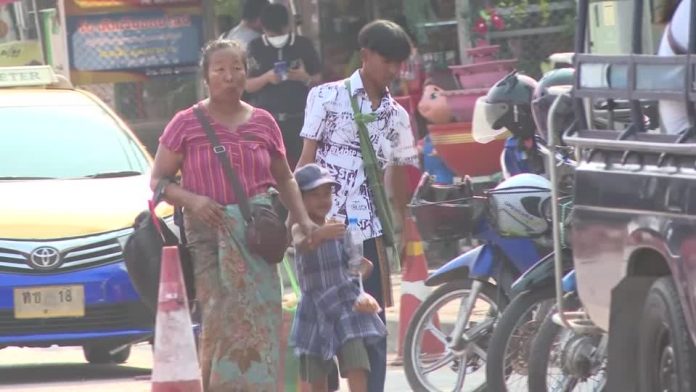By Nicha Wachpanich
Thailand’s government recently placed importance on providing humanitarian assistance for the Myanmar people, who’ve had their lives upended by the 2021 military coup.
But with the key border town of Myawaddy falling to the Karen National Liberation Army (KNLA), the armed wing of the Karen National Union (KNU), the new dynamic may complicate Thailand’s activities.
On March 25, the Thai Red Cross began aid shipments from Mae Sot, Tak Province into Myawaddy, Karen State. This is what Bangkok calls its “humanitarian corridor” or “safe zone.” This is in line with the new strategy known as the “Four-point plan” for Myanmar which was mentioned in the Thai parliament.
All aid from Thailand was handed to the Myanmar Red Cross, which is a proxy of the military regime in Naypyidaw. But some aid trickled into areas under the control of the KNU, Myanmar’s oldest ethnic armed organization.
Three years after the coup with over 2.8 million Internally Displaced Persons (IDPs) in Myanmar, this complete 180 degree turn from Thailand has left Thais unsure whether their government is actually helping or hindering humanitarian aid.
On April 10, the Thai military took steps to prepare for an influx of up to 100,000 refugees from Myanmar to enter Thailand, according to Foreign Minister Parnpree Bahiddha-nukara, despite it not being a signatory to the U.N. Refugee Convention.
Humanitarians working along the border expect these refugees to be forced back into Myanmar at some point, which has been done repeatedly since 2021.
“The Thai government has been pro-[regime] since the previous military government era to now, possibly because they believe [it] would not lose. But now the situation has changed,” said Lalita Hanwong, an advisor to the National Security, Border Affairs, Strategies and Reforms committee.
On April 9, Thailand’s Prime Minister Srettha Thavisin called for an urgent meeting at Government House in Bangkok to discuss the situation with the Ministry of Foreign Affairs and the National Security Council.
The meeting concluded in forming a specialized task force, primarily overseen by the Ministry of Foreign Affairs, with the Secretary-General of the National Security office participating, to enhance the efficiency of Thailand’s response to the crisis along its 2,401 km-long border with Myanmar.
Srettha posted on the social media platform X (formerly Twitter) that Thailand would be a neutral actor in Myanmar and work through its partners in the Association of Southeast Asian Nations (ASEAN).
“Thailand will provide humanitarian assistance in line with the ASEAN protocols, but we will not intervene or take [the] side of any stakeholders. This is a matter of military security.”
But Srettha’s pledge to remain neutral has been criticized by experts, especially considering Bangkok allowed a Naypyidaw request to land its aircraft at Mae Sot airport on April 7 to evacuate 600 of its troops and family members who surrendered to the KNU in Myawaddy last Friday.
Media reports have stated that the flight was transporting banknotes from regime-run banks in Myawaddy to Yangon, Myanmar’s economic and commercial hub.
“Thailand needs to do more in providing humanitarian assistance to those affected despite their different political backgrounds. As there are many political refugees, we should ease up on the Immigration law and other related legislations,” said Chaturon Chaisang, an advisor to the Thai parliament’s Foreign Affairs committee.
He added that the committee believes Thailand must reach out to other groups in humanitarian aid deliveries, not only the regime-proxy Myanmar Red Cross.
Lalita’s parliamentary committee held a seminar at Government House in Bangkok on March 2-3 to examine the three years since the Myanmar military coup and invited several anti-regime activists.
Foreign Affairs Minister Parnpree Bahiddha-nukara was scheduled to give a speech at the seminar but cancelled at the last minute.
“Thailand has never had a clear diplomatic direction toward Myanmar which makes each authoritative body act with unsynchronized manners and on a case by case basis,” added Lalita.
Last month, Chaturon’s parliamentary committee mentioned “A four-point plan” to tackle Myanmar’s crisis. Apart from its call to engage more actors in humanitarian aid deliveries, it also called for a “Troika Plus” to achieve peace in Myanmar with Thailand leading negotiations through ASEAN, but also including China and India in negotiations.
Bangkok has its first civilian government after a decade of its own military regime. The Thai government under Prime Minister Srettha Thavisin seems to have learned from the Move Forward Party, which won the most seats in last year’s election but failed to form a government, on how to get his Pheu Thai Party to make addressing the Myanmar crisis a foreign policy objective.
“So far I have not seen much difference compared with the previous military government,” concluded Lalita.
Nicha Wachpanich is a freelance journalist based in Bangkok, Thailand.



